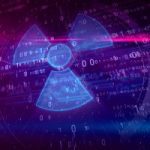Biography
Dr. Anagnostopoulos research lies on the interface of radiochemistry, analytical chemistry and environmental chemistry. His group focuses on nuclear fuel disposal, environmental radiochemistry, and design of sensitive analytical protocols for the speciation and determination of contaminants at trace levels and nuclear forensics signatures.
One of the group’s research areas focuses on the proliferation of radionuclides in the environment by studying sorption, complexation with ligands and macromolecules, interface redox phenomena and mineral incorporation, using kinetic and speciation modelling tools.
In a similar way, projects dealing with nuclear fuel disposal focus on the chemistry of solid and aqueous phases within the nuclear waste, as well as radionuclide interaction with geological media representative of repositories, simulating scenarios of waste tank leakage or human intrusion. Of particular interest is the development of materials for radionuclide retardation in barrier systems within the waste repositories and waste processing.
His group is using state-of-the-art analytical techniques in order to develop sensitive and reliable analytical methods for the speciation of radionuclides at trace levels in a wide array of matrices. His research in nuclear forensics currently revolves around the formation and characterization of surrogate nuclear explosion debris and their stability in the near and far field as a function of environmental parameters.
He has participated in worldwide standard material testing trials organized by the International Atomic Energy Agency (IAEA) and he has spearheaded projects funded by the Department of Energy – Office of Environmental Management, the U.S. Nuclear Regulatory Commission and the National Nuclear Security Agency.
Area(s) of Research
RESEARCH INTERESTS
- Radiochemistry
- Environmental Chemistry – Remediation Technologies
- Nuclear Fuel Cycle – Waste Processing & Disposal
The Environmental Radiochemistry Research Group led by Dr. Vasileios Anagnostopoulos focuses on fundamental and applied aspects of radiochemistry and environmental chemistry.
One of the group’s main research areas is the fate of contaminants, such as heavy metals, radionuclides and organic pollutants in the environment. Our group studies the geochemical transformations of contaminants due to their interaction with Natural Organic Matter (NOM) and the redox phenomena that take place on the sediment-water interface, as well as mineral incorporation.
Our studies also focus on the retention-release cycles of contaminants in the natural environment as a function of ligand presence, redox potential, ionic strength etc. through kinetic, thermodynamic and speciation studies.
The elucidation of the mechanisms that dictate the behavior of contaminants in the environment allows us to develop and test the sustainability of innovative remediation strategies for different environmental systems, such as soil, groundwater, and the vadose zone.
Dr. Anagnostopoulos’ research also involves studies in the field of used nuclear fuel disposal. Studies focus on radionuclide interaction with geological media representative of waste disposal sites (geological repositories) under relevant conditions (reducing conditions, elevated temperature, and ionic strength) simulating scenarios of waste tank leakage or human intrusion. Of particular interest is understanding the fate and the risk associated with radionuclides released from radioactive waste, as well as the development of materials for radionuclide retardation in barrier systems within the waste repositories and waste processing.
Publications
- Morozov AN, Govor EV, Anagnostopoulos VA, Kavallieratos K, Mebel AM (2018). Coordination of Sm(III) and Am(III) to the 1,3,5-Tris-(4-(iso-propyl)-phenylsulfamoylmethyl)benzene Ligand: An Experimental and Theoretical Study. Molecular Physics, doi.org/10.1080/00268976.2018.1471228
- Gonzalez-Raymat H, Anagnostopoulos VA, Katsenovich Y, Denham M. (2018). Study of unrefined humate solutions as a potential remediation method for groundwater contamination from U(VI). Journal of Environmental Management, 212, 210-218
- Anagnostopoulos VA, Katsenovich Y. Lee B., Lee H (2018). Biotic dissolution of autunite under anaerobic conditions: effect of bicarbonates and Shewanella oneidensis MR1 microbial activity. Journal of Environmental Radioactivity (accepted)
- Anagnostopoulos VA, Katsenovich Y, Denham M (2017). Sodium silicate treatment for the attenuation of U(VI) in acidic groundwater plumes. Journal of Chemical Technology and Biotechnology, 92(8), 1919-1927
- Anastopoulos I, Anagnostopoulos VA, Bhatnagar A, Mitropoulos CA, Kyzas GZ (2017). A review for chromium removal by carbon nantubes. Chemistry and Ecology 33 (6), 1-17
- Anagnostopoulos VA, Koutsoukos PG, Symeopoulos BD (2015) Removal of U(VI) from aquatic systems, using winery by-products as biosorbents: equilibrium, kinetic and speciation studies. Water, Air and Soil Pollution 226 (4), 107-113
- Anagnostopoulos VA, Symeopoulos BD (2013). Sorption of europium by Malt Spent Rootlets, a low-cost biosorbent: effect of pH, kinetics and equilibrium. Journal of Radioanalytical and Nuclear Chemistry 295 (1), 1-7
- Anagnostopoulos VA, Manariotis ID, Karapanagioti HK (2012). Removal of mercury from aqueous solutions by Malt Spent Rootlets. Chemical Engineering Journal 213, 135-141
- Anagnostopoulos VA, Bekatorou A, Symeopoulos BD (2011). Contribution to interpretation of metal uptake dependence upon the growth phase of microorganisms. The case of U(VI) uptake by common yeasts, cultivated at different temperatures, with or without aeration. Journal of Radioanalytical and Nuclear Chemistry 287 (2), 665-671
- Carro L, Anagnostopoulos VA, Lodeiro P, Barriada JL, Herrero R, Sastre de Vicente ME (2010). A dynamic proof of mercury elimination from solution through a combined sorption-reduction process. Bioresource Technology 101 (23), 8969-8974



